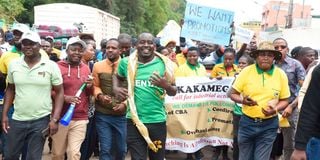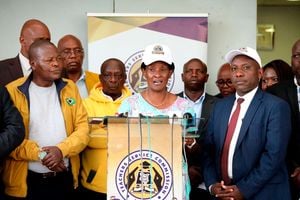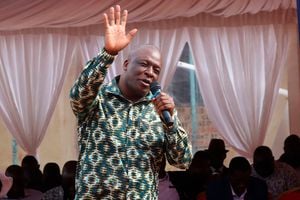
Kuppet Kakamega Branch teachers protest on the streets of Kakamega town on September 2, 2024.
The fate of the 46,000 junior school teachers who are employed on contract now lies with President William Ruto following their exclusion in the return-to-work deal between the Teachers Service Commission (TSC) and the Kenya Union of Post Primary Education Teachers (Kuppet).
The teachers, commonly referred to as interns, now accuse Kuppet and the Kenya National Union of Teachers (Knut) of having used them as one of their grievances and then abandoning them once they achieved their other demands. While Knut called off its strike on its eve, Kuppet members boycotted work until Monday, September 2, evening.
In an interview with the Nation, Kuppet Secretary-General Akelo Misori said that the matter of the conversion of the teachers to permanent terms was political and that the union would discuss it with the President.
“We’ve got nearly everything that we could’ve gotten from a strike. You cannot get everything that you set out to get. It [employment of JS teachers] is something which was in politics; that the Cabinet Secretary for Education gave us a promissory note of Sh47 billion. We’ll see the President over this matter. “
The TSC was to include it according to our list of demands in our return-to-work formula but we had to leave it out because it’s subject to further engagement with the government.
The TSC wanted a commitment from [National] Treasury that this money was available so that we could include it [in the agreement],” Mr Misori said.
A few days before the strike started, Treasury Cabinet Secretary John Mbadi had said there was no money for confirmation of the JS teachers, only for him to retract the statement and say that they will be confirmed in January 2025.
The JS teachers issue did not form part of the consent filed in the Employment and Labour Relations Court by TSC and Kuppet on Wednesday, September 4 and admitted yesterday, September 5.
Mr Misori explained that it was omitted because it is dependent on TSC receiving the money from Treasury. JS teachers went on strike in May demanding to be employed on permanent terms and only resumed duty after assurances that they would be absorbed in July.
This, however, did not happen, with the government claiming that after the rejection of the Finance Bill, 2024, there wasn’t enough money to employ them teachers and they would have to wait until January 2025. The joint statement signed by top TSC and Kuppet officials was non-commital on the employment of the teachers on permanent terms, simply stating that “the government has provided resources for retooling of JS school teachers”, which was not a demand by the teachers.
“This development is not a surprise as the two unions opposed the four-week strike by junior school teachers, which paralysed learning at the start of the second term. Both unions seem to have used the JS confirmation agenda as bait to achieve implementation of their collective bargaining Unions throw junior high teachers under the bus agreements, which was their priority. The 46,000 JS teachers is a non-issue to them,” John Melvin, a JS teacher told the Nation.
He was one of the mobilisers during the strike in May. About 700 of the teachers who participated in the strike had had their contracts cancelled but they were later reinstated.
Mr Melvin said the teachers had not been paid for the last three months. “This has made life unbearable as most of them are unable to make ends meet. Who is pocketing the stipend?” he asked.
When TSC met Kuppet and Knut officials on August 21 in talks aimed at forestalling the strike, the press statement by the employer omitted the JS teachers from the list of issues discussed.
The unions who addressed a separate presser, however, had it in their list of demands. A day after the strike by members of Kuppet commenced on August 27, Education CS Julius Migos Ogamba issued a statement that touched on the fate of JS teachers.
“The government has also provided Sh18.7 billion for the conversion of intern teachers to permanent and pensionable status in January 2025,” Mr Ogamba said. Another JS teacher leader Omari Omari demanded the immediate confirmation of the teachers to permanent status.
“We feel cheated by both Knut and Kuppet. Our agenda in their strike was just a public relations gimmick as their only interest is our numbers to boost their membership when we’re confirmed. We tried to reach out to them but they weren’t willing. Last week, we met officers from TSC and the chair of the Education Committee of the National Assembly [Julius Melly]. They gave us assurance that we’ll be confirmed in January but we’re suffering,” he said.







